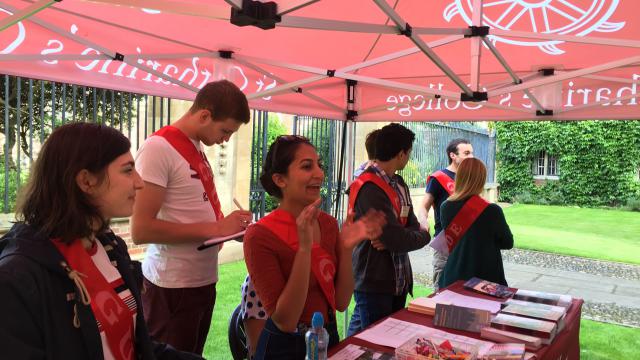Name: Promise Knight
Hometown: Brent, London, UK
Extracurricular interests: Representing Stonebridge ward on Brent London Borough Council and serving as Cabinet Member for Housing, Homelessness & Renters Security; also running and reading
Postgraduate degree: PhD in Education
Undergraduate life at Catz
“I was born in Nigeria and lived there until I was about three when I joined my mother in the UK. As a child, I faced overcrowded social housing, fuel poverty and beginning primary education with English as an additional language. By the age of 16, I became estranged from my parents and was abandoned to my own devices both socially and economically. My journey from a low-attaining comprehensive school in north-west London to St Catharine's in 2007 to read English at 17 years old was statistically improbable but it was made possible thanks to the support of a trusted mentor and teachers, as well as outreach programmes.
“Having made it to Catz, my undergraduate experience was challenging: I was essentially so far behind that I came to College a week before everybody else to take part in introductory learning sessions, and the sense of always playing catch up was difficult to shake off – but I loved my subject and for me it had always been the thing that motivated me the most. This passion was something I held on to until the end of my final year, when I graduated at the top of my class.
“During my undergraduate years at Catz, I was fortunate to be supported each step of the way by my Director of Studies, Dr Hester Lees-Jeffries, and the Senior Tutor at the time, Dr Paul Hartle. Because others believed in me very deeply, I was encouraged to challenge and change my own perception of myself and what I could achieve.”
Postgraduate life at Catz
“Now a young mother, I am delighted to return to Catz for postgraduate studies – first for an MPhil in Public Policy and now my PhD. Once you have left academia and are in the world of work, it is rare to have space for reflection. I doubt that I would be able to develop my thinking and connect the dots between different ideas and data as effectively without the framework of a part-time PhD.”
“A part time approach to my PhD enables me to collect sufficient data, relevant to large samples sizes; as well as further develop statistical approaches to my research and identify robust proxy measures relevant to educational disadvantage. It also allows me to continue to serve as Cabinet Lead Member at the London Borough of Brent. My work at Brent, notably, issues of educational inequalities prevalent in the communities that I serve remain in close alignment with my doctoral research.”
Postgraduate studies
“My PhD focuses on School Composition Effects (SCE). This includes the impact of heterogeneous socioeconomic conditions on school outcomes. It involves how a broader distribution of economic and social characteristics could raise school effectiveness and improve learning outcomes for low socio-economic status (SES) students.
“My research investigates what effect mixed socioeconomic composition in school environments in the UK has on learning outcomes, social and mental wellbeing, and labour market trajectory for low SES students. It looks to uncover the extent to which heterogeneity within schools counterbalance neighbourhood effects such as deprivation. Parental networks and participation through parent teacher associations (PTA) further enhance peer, teacher and facilities effect.
“The project will employ parental school and home-based participation as a measure of parent-initiated volunteerism or involvement in order to further investigate the effects of the value of parental investment on learning gains for low SES students. I hope to meaningfully contribute to educational policy development to ensure that young people from similar backgrounds to mine are able to fully benefit from schools.
“My area in Brent is ranked amongst the highest in the country for the number of children living in households receiving out-of-work benefits. This deprivation has been made worse by the rising cost of living, and the social and educational challenges arising from COVID-19. It is vital that the relevant policy infrastructure exists in places like Brent, and I hope my research can help.”
The Harding Distinguished Postgraduate Scholars Programme
“The full funding and generous research allowance that I have received from the programme for my PhD is hugely important. After three years of unpaid maternity leave, my only source of income is the local authority allowance that I am entitled to as a councillor. This is not sufficient in itself to meet the entire cost of university fees, doctoral research expenses and childcare, and I was not going to be able to accept my PhD offer and stay connected to Cambridge without this much needed financial support.”
Advice for undergraduates thinking of applying for postgraduate studies
“Plan well in advance! This will give you time to do your research and find people within the academy who are relevant to your interests and can support you to achieve your goals. I did a scoping exercise before starting the application process and found out who was interested in similar topics and whether they were willing and had time to support a PhD student. Essentially, you are trying to replicate the type of relationship that an undergraduate student at Cambridge might have with a Director of Studies, but you have to find them yourself and see if you can establish a connection.”






